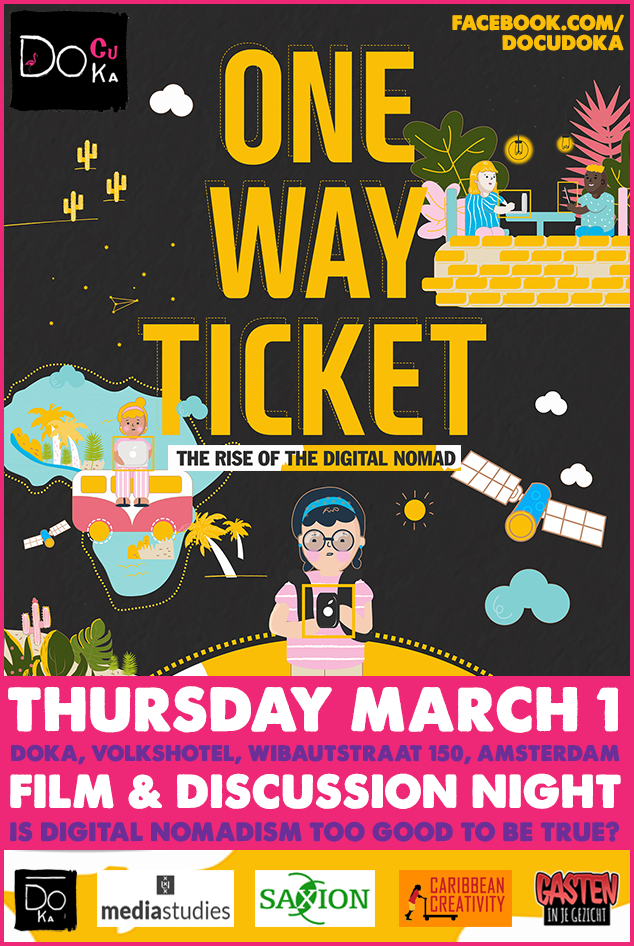DocuDoka #9: Is Digital Nomadism Too Good To Be True?
On Thursday March 1st DocuDoka organizes a film and discussion night on the world of digital nomads. The night in creative bar Doka starts with the exclusive Dutch premiere of One Way Ticket: The Digital Nomad Documentary by South Korean journalist and filmmaker Youjin Do on the rise of digital nomadism around the globe. Following the screening, there will be an interactive discussion on the ups and downs of digital nomadism as a personal lifestyle and economic model with, among others, with Simone Grau of travelgirls.nl, Fairouz Kaddour, the founder of We Are Digital Nomads and one of the initiators of Nederlandse Digital Nomads, and Melissa de Jonge, who did research on digital nomads.
*****
PROGRAM DocuDoka #9: Is Digital Nomadism Too Good To Be True?
20.00 Doors open
20.15 Introduction by moderator Reinier Jacco Maarten Vriend (Volunteer Correct)
20.25 Screening of One Way Ticket: The Digital Nomad Documentary (2017, 76 min, Dutch premiere!)
21.40 Break
21.50 Panel discussion with Simone Grau, Fairouz Kaddour and Melissa de Jonge
22:30 End, possibility to chat at the bar, start regular Doka night (until 7 in the morning!)
TICKETS €10 (regular) or €7,50 (student)
http://bit.ly/docudoka9-digitalnomads
Download the official press release here.
*****
Digital nomads are people, primarily from the United States and Europe, who use digital technologies to work remotely and live a nomadic lifestyle. They often work in countries in the Global South, from local homes, coffee shops, public libraries, co-working spaces and even camping sites. For many young people, being a digital nomad offers an alternative to the traditional idea of a physical workspace and allows them to work and live from anywhere they want. Although the exact number is difficult to pin down, millions of people around the world have already adopted the digital nomad lifestyle. Dutch creative entrepreneur and digital nomad Pieter Levels even estimates that ‘there will be one billion digital nomads by 2035’. As this new lifestyle is rising in popularity, companies and governments are adopting new strategies to facilitate these remote workers. Thus, digital nomadism is becoming mainstream and will change – and is already changing – the world’s economy and society-at-large. What does a digital nomad lifestyle look like? What are the pros and cons of digital nomadism? And, on a more general level, is it the future of work, a new form of neocolonialism or just a passing fad? These questions form the basis of DocuDoka #9: Is Digital Nomadism Too Good To Be True?
The evening will kick off with the screening of One Way Ticket: The Digital Nomad Documentary, the first documentary on digital nomads that exactly addresses these questions. Through interviews with advocates, academics and authorities – from the founder of a co-working space in Bali, Indonesia, to Tim Ferriss, author of 2011 bestseller The 4-Hour Workweek – the film examines various issues surrounding the supposed ‘dream life’ of the twenty-first century. The film is directed and produced by Youjin Do, a digital nomad herself throughout the past four years (based between Miami and Korea) and the author of Digital Nomad, the first book about digital nomads in Korea. One Way Ticket is her first feature-length documentary. Do made the film completely independently with the help of crowdfunding and with the aim to, as she put it herself, ‘stop selling the digital nomad lifestyle as a miracle cure and instead expose its reality.’ The screening of One Way Ticket: The Digital Nomad Documentary at DocuDoka marks the Dutch premiere of the film.
After the screening, there will be a discussion with the audience and three experts on digital nomadism, Simone Grau, Fairouz Kaddour and Melissa de Jonge. Grau is editor at online travel magazine travelgirls.nl and also writes about her (business) travels on her blog Monagrau.com. Kaddour is the founder of We Are Digital Nomads and the initiator of Dutch Digital Nomads, a Facebook group connecting Dutch digital nomads with each other. De Jonge recently graduated from the Erasmus University Rotterdam with a thesis on how the workplace affects the creative performance of digital nomads. Both the screening and discussion afterwards will be in English.
Tickets for this edition of DocuDoka are available online for €10 at http://bit.ly/docudoka9-digitalnomads (€7,50 for students when showing their student ID at the door). If not already sold-out in pre-sale, tickets can be bought at the door as well. As seating is limited, advance ticketing is advised.

